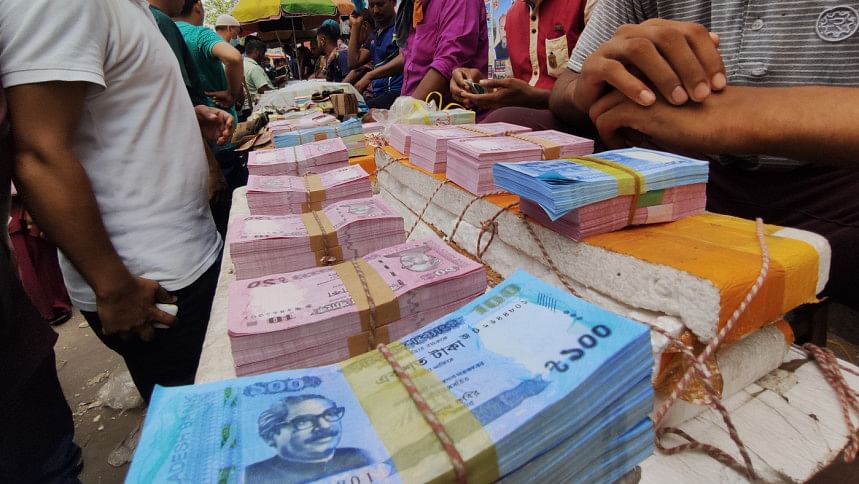Buying new banknotes: An Eid tradition

What's your earliest memory of Eid as a child? Waking up, taking a bath, saying the Eid prayer, and then collecting your salami from the elders? Surely you remember the salami being in the form of new banknotes? After all these years, new taka for Eid is still a thing. To cater to this need, there is a buoyant market where new banknotes are sold, a makeshift bazaar where new takas are the commodity!
Of New Notes and Eid
Eid brings happiness to all who celebrate. The festivity of Eid is elevated by people's interest towards another word, shopping! From new clothes and new shoes to anything new you can think of. So why not new banknotes? The answer to that question is — why not indeed?
In order to meet this need for new 'everything', every year before each Eid, new banknotes make an appearance.
Of course, currency notes have no intrinsic value, and new or old, a 500-taka note will always be valued at Tk 500 precisely. So why this interest in new takas and why during Eid and not for the rest of the year?
"It's mostly for the children. Personally, I don't care much for it but the kids just love it. And I'll admit, even the adults don't mind new notes if you hand it to them on Eid day," said one Selim Hasan after buying about Tk. 40,000 worth of new notes for Tk. 43,000 from Motijheel area.
"The excitement is always greater on Eid day. That's why we save the notes for that day. I'm sure even you remember from your childhood days," added Hasan who is a regular customer of the new currency market adding that he buys from the same vendor every Eid.
Getting New Taka
There are two ways one may acquire new notes. The first and more appropriate way is obviously to go to a bank. New notes are regularly released before Eid and one may get their hands on them through a bank. But this might require you to stand in a queue and there is a limit on how many new notes you can get. Many prefer to avoid standing in the line and opt for a different method — street vendors.
Money is not supposed to be exchanged for more than its authorised value but new taka is sold by street vendors much like any other product, for a profit. That means one has to spend more than the value of the notes they are acquiring.
On average, a bundle of new notes is sold at a price of anything from Tk 150 to Tk 200; sometimes even more depending on the demand. In Dhaka, there are two hotspots where new taka is sold. Motijheel and Gulistan.
The street vendors sit with their bags full of notes and display them on a table or a small stool. The new notes look vibrant and enticing and often draw a crowd. Both male and female vendors are seen selling new notes before Eid. While some vendors continue this business throughout the year, Eid is the season when the business truly blooms.
The Street Vendors
Each street vendor is occupied with two noticeable things that are common. The first one is their big bulky bag or sack full of new banknotes. The other one is their stool or table; a surface on which they display the notes. The average vendor will display a few bundles of all the different denominations that are available to them.
The rest will be securely kept in their bag until they are needed. A single bundle contains 100 notes of the same denomination. And for each bundle, a customer has to pay Tk 150 to 200 more than the face value. That means for a bundle of Tk 5, one has to pay about Tk 650 (Tk 500 for the actual value and Tk 150 to the vendor).
"I come here by 9:30 or 10 in the morning. And I will stay here till 5", said one Amina Khatun (altered name) who sat under an umbrella with her stall displaying new notes. "Business this year is comparatively bad," she added observing that by 20 Ramadan every season, the business really peaks up. "Normally, there is a crowd during this time of the season. Everyone wants a bundle of Tk 10 or 20," she added observing that the smaller denominations have a higher demand.
"I've been doing this for a while, a few years actually. You will not believe it but we really do not make much profit," she said pointing out that most of the makeshift stalls at Motijheel will both buy and sell new notes. An average street vendor will exchange a few lacs taka daily during the Eid season.
The Appeal
The appeal of new notes is easily understandable. People have a natural inclination towards new things. There is a saying from a sitcom, "New is always better". While it remains debatable, the appeal of new things cannot be denied and it remains the same for something as tangible and volatile as money itself.
New notes contain a certain smell. The way the notes are unyielding, sharp to the edges, the way they are kept together by a rubber band, making a perfect rectangle that is oddly pleasing, and the bright colours beckoning like they are more than money. At the risk of exaggerating, dare I say that new notes hold an emotional value, especially to children.
The adults may not care much for such emotions but the children sure love it and the adults love watching the children smile. If that can be induced by something like a new note then what's the harm?

 For all latest news, follow The Daily Star's Google News channel.
For all latest news, follow The Daily Star's Google News channel. 








Comments